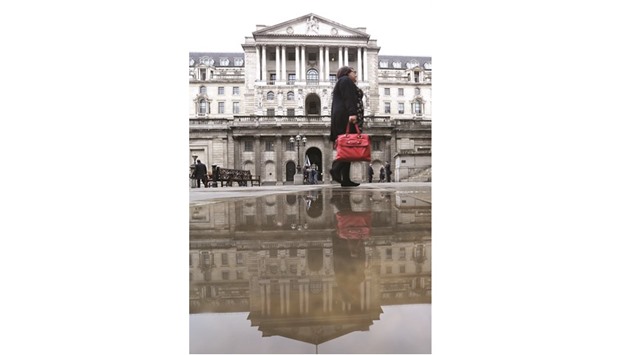Bank of England officials kept their key interest rate at a record low and said uncertainty stemming from Britain’s referendum on its European Union membership may delay investment decisions and curb growth.
The nine-member Monetary Policy Committee, led by governor Mark Carney, unanimously agreed to maintain the benchmark at 0.5% — where it’s been for seven years. The decision was taken against a backdrop of feeble inflation, slowing global growth and concern that the UK will vote to quit the EU on June 23.
“There appears to be increased uncertainty surrounding the forthcoming referendum on UK membership of the European Union,” officials said in the minutes of their March meeting.
“That uncertainty is likely to have been a significant driver of the decline in sterling. It may also delay some spending decisions and depress growth of aggregate demand in the near term.”
The minutes showed the central bank’s broader economic view is similar to the one it outlined in its February Inflation Report, where it contrasted domestic strength with a darkening international outlook. That echoes the Federal Reserve, which scaled back its projection for US interest-rate hikes on Wednesday, citing global factors.
“Challenges facing emerging markets remained,” the BoE said. Risks to the MPC’s projections for global growth “continued to lie to the downside.”
The pound strengthened and was up 0.9% at $1.4385 at 12:08pm London time. Sterling has been one of the weakest performing Group-of-10 currencies over the past month, as ‘Brexit’ jitters rattled investors.
The MPC has a “range of views” on the outlook for inflation, while agreeing that current monetary policy settings are appropriate for now, the minutes said. The meeting record signals tightening is still some way off, particularly with the EU poll looming.
Still, robust domestic consumption was likely to continue and “the committee’s best judgement was that it was more likely than not that bank rate would need to increase over the forecast period to ensure inflation returned to the target in a sustainable fashion,” the minutes said.
Policy makers have signalled they’re waiting for more signs of a pickup in price pressures before increasing borrowing costs. Inflation, at 0.3% in January, has been below the central bank’s 2% target for two years and the BoE said in February the rate will average 0.8% this year.
Questions remained about the extent to which low price pressures will feed in to wages, the minutes said. Evidence suggested “some effect was likely to be present in the current wage data,” they said. Officials said they remain “watchful” for signs that low inflation is feeding in to pay settlements.

The minutes showed the central bank’s broader economic view is similar to the one it outlined in its February Inflation Report, where it contrasted domestic strength with a darkening international outlook
